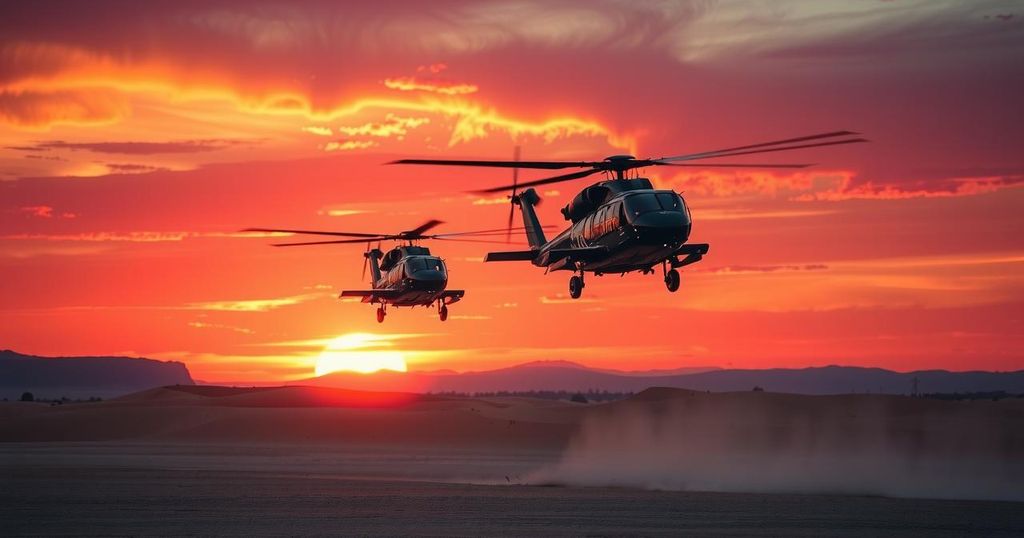Global news
AFRICA, CIVIL WAR, GEORGE H. W. BUSH, HUMAN RIGHTS VIOLATIONS, HUMANITARIAN, HUMANITARIAN CRISIS, MILITARY, MOGADISHU, MOHAMMAD FARAH AIDID, NORTH AMERICA, SNA, SOMALI NATIONAL ALLIANCE, SOMALIA, U. N, U. S, UN, UNITAF, UNITED NATIONS, UNITED NATIONS ’ UNITED TASK FORCE, UNITED STATES, UNOSOM, US
Jamal Walker
0 Comments
The Battle of Mogadishu: A Turning Point in U.S. Military Engagement
The article recounts the 1993 Battle of Mogadishu, where U.S. forces faced significant losses in Somalia amidst attempts to combat famine and civil unrest. It highlights the establishment of various UN missions aimed at restoring peace and the challenges encountered by these efforts. The repercussions of the battle led to a reevaluation of U.S. foreign policy, stressing ongoing humanitarian concerns in Somalia.
Somalia has endured extensive strife, facing severe food insecurity rooted in famine conditions for years. This backdrop evokes memories of the 1993 Battle of Mogadishu, during which the U.S., participating in a UN-led mission, lost two Black Hawk helicopters and 18 soldiers. Initially, the United Nations established the United Nations Operation in Somalia (UNOSOM) in 1992 to assist in mitigating the impact of the civil war and humanitarian crises in the country.
The UN also initiated ‘Operation Provide Relief’ to deliver food aid; however, the ongoing conflict damaged these efforts. As food assistance faltered due to factional violence, the UN escalated its intervention, leading to the U.S. executing Operation Restore Hope in December 1992 to combat famine. This operation resulted in the formation of the United Task Force (UNITAF), a multinational military entity authorized to employ force to restore peace and order.
By March 1993, the mission expanded from UNITAF to UNOSOM II. However, it faced substantial challenges as General Mohammed Farah Aidid, leader of the Somali National Alliance (SNA), resisted its efforts to secure aid deliveries. The mission evolved from purely humanitarian support to focusing on rewriting Somalia’s political structure.
Despite attempts to secure a ceasefire for humanitarian access, conflict escalated, leading to a significant ambush of Pakistani troops in June 1993, followed by further violence between UNOSOM forces and Somali militias. These clashes marked pivotal points in the worsening hostility, culminating in the infamous Battle of Mogadishu.
In August 1993, the U.S. launched an operation dubbed ‘Gothic Serpent’ aimed at capturing General Aidid. On October 3, U.S. troops attempted a mission intercepting a SNA meeting, which turned into a protracted firefight as Somali militias counterattacked, ultimately shooting down two Black Hawk helicopters.
Significantly, out of the fray, one pilot, Michael Durant, was captured. “It was a huge gun battle. They say that 25 Somalis were killed by gunfire at crash site two, so that gives you some insight into how much shooting was going on,” Durant commented later. The battle resulted in 18 U.S. soldier fatalities and widespread civilian casualties, significantly swaying U.S. public opinion against continued involvement in Somalia.
In response to the increased casualties, President Bill Clinton announced the withdrawal of American troops from combat by March 1994. This battle marked the deadliest day for U.S. military personnel since the Vietnam War and compelled a reevaluation of U.S. foreign policy regarding military intervention in humanitarian crises.
The debate over America’s role in global peacekeeping was accentuated by the events in Somalia, leading to an eventual cessation of UNOSOM II. “The United States has long had to face the challenge of determining to what degree it wants to participate in global peacekeeping efforts,” noted the U.S. State Department on the implications of the events
Despite the historical context, Somalia continues to grapple with violence and food scarcity. Currently, the World Food Program forecasts that around 1.7 million children in Somalia will face acute malnutrition through 2025, largely due to ongoing drought and insecurity, indicating that the challenges Somalia faced decades ago remain prevalent today.
The Battle of Mogadishu exemplifies a significant moment in U.S. military history, illustrating the complexities of intervention in conflict zones. The loss of life and dramatic shifts in public sentiment about foreign engagement following the battle underscore the lasting implications of military operations on foreign policy. Despite efforts made over the years, Somalia remains embroiled in conflict and humanitarian crises, emphasizing the need for renewed international focus on addressing its challenges.
Original Source: www.eurasiantimes.com




Post Comment